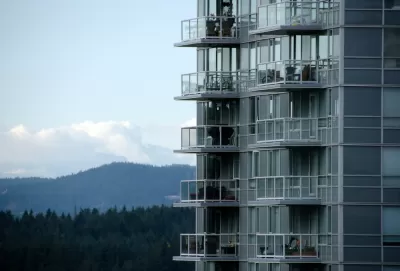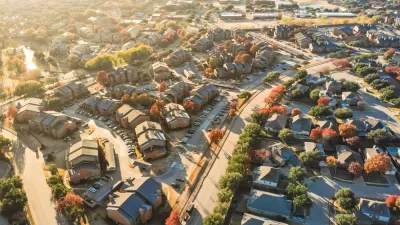Policies that encouraged urban segregation and led to the displacement and disenfranchisement of communities of color continue to reverberate in Canada's urban centers.

"In a 2012 report by the Canadian Centre for Policy Alternatives on municipal exclusion, author Ian Skelton noted that, 'the practice by municipalities of using controls on land use to constrain their social composition is a long standing one in Canada,'" reports Angela Wright in The Globe and Mail. In one example, Vancouver's Hogan's Alley, once a thriving Black community, "was demolished in the 1960s to make way for a municipal viaduct." Now, a group called the Hogan's Alley Society "wants to create a non-profit community land trust that would provide 70 per cent below-market rent and 30 per cent market rent with no private ownership."
Byron Nicholas, supervising transportation planner for Hudson, N.J., and creator of Black + Urban, "explains that when developers build luxury apartments with private amenities available only to residents, they are making decisions about who they want to make comfortable and provide services for and, by extension, who they care about." Privately owned public spaces have the potential to counter this exclusion, Wright says, "[b]ut to have this type of community-based planning approach, cities must address zoning bylaws." Zoning in Canadian cities, as elsewhere, "has been in the past used to control and segregate people," says Sandeep Agrawal of the School of Urban and Regional Planning at the University of Alberta. Now, cities like Edmonton, who Agrawal is working with, are taking a fresh look at their zoning codes "from equity and inclusivity lenses to make bylaws more reflective of contemporary urban realities."
"Inclusionary zoning that allows for supportive housing and mixed-use housing would go a long way to combat" the discrimination and marginalization created and perpetuated by racist zoning policies both past and present, says Agrawal. "Advocates say this can only be done with government investment in affordable and community housing." And while Canada's government supports community housing "through capital investments or loans," some activists say the programs are based on the "faulty notion that non-profit and community housing can be self-sustaining," advocating instead for ongoing housing subsidies and income supports.
FULL STORY: Yes, remnants of discriminatory urban planning remain

Maui's Vacation Rental Debate Turns Ugly
Verbal attacks, misinformation campaigns and fistfights plague a high-stakes debate to convert thousands of vacation rentals into long-term housing.

Planetizen Federal Action Tracker
A weekly monitor of how Trump’s orders and actions are impacting planners and planning in America.

In Urban Planning, AI Prompting Could be the New Design Thinking
Creativity has long been key to great urban design. What if we see AI as our new creative partner?

How Trump's HUD Budget Proposal Would Harm Homelessness Response
Experts say the change to the HUD budget would make it more difficult to identify people who are homeless and connect them with services, and to prevent homelessness.

The Vast Potential of the Right-of-Way
One writer argues that the space between two building faces is the most important element of the built environment.

Florida Seniors Face Rising Homelessness Risk
High housing costs are pushing more seniors, many of them on a fixed income, into homelessness.
Urban Design for Planners 1: Software Tools
This six-course series explores essential urban design concepts using open source software and equips planners with the tools they need to participate fully in the urban design process.
Planning for Universal Design
Learn the tools for implementing Universal Design in planning regulations.
Gallatin County Department of Planning & Community Development
Heyer Gruel & Associates PA
JM Goldson LLC
City of Camden Redevelopment Agency
City of Astoria
Transportation Research & Education Center (TREC) at Portland State University
Jefferson Parish Government
Camden Redevelopment Agency
City of Claremont





























